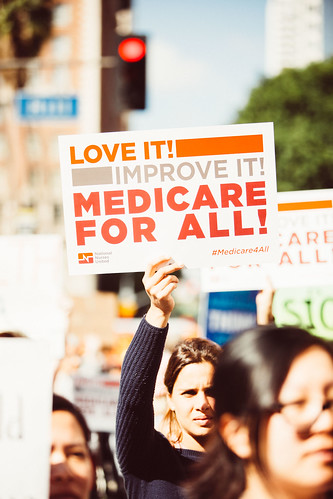When all the Establishment-backed contenders for the Democratic presidential nomination support some version of a public option, it's a safe bet that corporate interests that finance the DNC are the ones that are being served. As corporatist candidates like Harris and Biden fail to resonate, new champions of "pragmatic" approaches to reform rise to take their places. Even progressive darling Elizabeth Warren favors an incremental approach that she thinks will lead to single payer, starting with a public option. Only Sanders has consistently indicated his willingness to take the lead in a fight for a Medicare for All now.
The arguments made by the corporatists in the party are having an effect. A substantial proportion of Democrats are buying the false claim that a public option is the only viable way to establish universal access to health care. That's shown in their growing support for a public option and decreasing support for a single-payer system like Medicare for All. It's disheartening that so many supporters of a single-payer system of health care are falling for the same nonsensical arguments that were used to undermine support for it during the "health-care reform" debate in 2009.
Those of us who understood then that the call for a public option was a bait-and-switch strategy to defuse the growing movement for a single-payer system must start all over again educating progressives about why it will not lead to single payer. Instead, it will just add one more plan to a multi-payer system of access to health care that is inherently inefficient. This inefficiency is the main reason that health-care costs per capita in the US are about twice the average in countries with universal health care. Americans will not accept another expensive half-measure that won't address the root problem or assure access to all.
The reason a public option won't lead to single payer is that a Congress saturated by lobbyist cash will never create a plan that would compete with private plans. Democrats who are ready to embrace Biden, Buttigieg or any other proponent of a public option have apparently forgotten that Senator Schumer explicitly stated in 2009 that Democrats had no intention of creating such a plan. They also fail to recall that the corporate Democrats who kept single payer off the negotiating table continued to claim that people would like the plan so much that Americans would eventually all want to join it, creating a single-payer plan by default. Nothing has changed since then.
To be fair, it's theoretically possible that a public option could at least provide universal coverage. However, that's not the same as universal access to health care. Anyone who has studied the issue understands that premiums, copays and deductibles remain a significant barrier to access to care for the insured. Financial barriers to access have dramatically increased since 1998, according to a recent Harvard study published in the Journal of the AMA. That study also showed that even the much-touted Obamacare expansion, expensive as it was, has not appreciably decreased the proportion of people who experience problems with access to affordable care. That's why one in four Americans report that they or a family member have put off needed care for a serious condition because of cost. In families earning less than $40,000 per year, that figure rises to one in three.
Insurance is not the same as access to care when financial barriers to using it persist. That even applies to patients on Medicare, who also often have serious difficulty paying for their medications. That's why single-payer advocates generally prefer the term "Improved Medicare for All" when referring to the plans advocated by most advocacy groups and members of Congress who actually understand these issues and support a single-payer solution to the continuing crisis in health-care access and affordability.
Improved Medicare for All refers to a system that is more comprehensive than Medicare, with coverage for vision, dental and hearing and medications, no or minimal premiums or copays and no deductibles. Some versions include long-term care, as is provided in several European countries such as France and the Netherlands. It is also a feature of one of the bills currently in Congress. All such bills introduced in the last few Congresses are variations on Improved Medicare for All because that is the type of single-payer system that is widely acknowledged to be the most politically palatable in the US due to the generally positive views of Medicare.
I won't go into the explanations of why single-payer systems are less expensive
than publicly funded and administered (single payer) systems (the basic reasons
are summarized in this bullet-point
document, which also points out other economic advantages). There are
endless articles written on the subject for the interested reader, but the
simple response to those who say we can't afford such a system is this:
countries that provide universal health care to all their residents using a
publicly funded and administered system provide care as good or better than the
US at the least cost.
If other countries can do it, the only thing stopping the US from doing the
same is the lack of political will due to Americans dithering about whether it
is politically possible. It will be possible only when we demand it. A single-payer plan like Medicare for All is the only affordable way to end the crisis
of health-care access and affordability in the US. Accept no substitutes.






